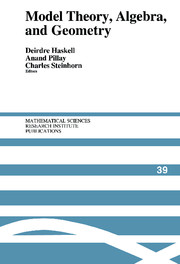Book contents
- Frontmatter
- Contents
- Overview
- Introduction to Model Theory
- Classical Model Theory of Fields
- Model Theory of Differential Fields
- A Survey on the Model Theory of Difference Fields
- Notes on o-Minimality and Variations
- Stability Theory and its Variants
- Subanalytic Geometry
- Arithmetic and Geometric Applications of Quantifier Elimination for Valued Fields
- Abelian Varieties and the Mordell-Lang Conjecture
A Survey on the Model Theory of Difference Fields
Published online by Cambridge University Press: 26 June 2025
- Frontmatter
- Contents
- Overview
- Introduction to Model Theory
- Classical Model Theory of Fields
- Model Theory of Differential Fields
- A Survey on the Model Theory of Difference Fields
- Notes on o-Minimality and Variations
- Stability Theory and its Variants
- Subanalytic Geometry
- Arithmetic and Geometric Applications of Quantifier Elimination for Valued Fields
- Abelian Varieties and the Mordell-Lang Conjecture
Summary
We survey the model theory of difference fields, that is, fields with a distinguished automorphism σ. After introducing the theory ACFA and stating elementary results, we discuss independence and the various concepts of rank, the dichotomy theorems, and, as an application, the Manin-Mumford conjecture over a number field. We conclude with some other applications.
These questions led Macintyre, van den Dries and Wood to look for a model companion of the theory of difference fields, and to prove various results (decidability, description of the completions, etc … ) for this theory, henceforth called ACFA. For details and attribution of results, see [Macintyre 1997]. I should also mention that the second problem was solved recently, by Hrushovski [1996b] and Macintyre [≥ 2000], showing that non-principal ultraproducts of fq's are models of ACFA. In 1994, Hrushovski and I started looking at stability-type properties of the theory ACFA. Our main result is a dichotomy result for types of rank 1 for models of characteristic 0, which was later partially extended to the case of positive characteristic with the help of Peterzil [Chatzidakis and Hrushovski 1999; Chatzidakis et al. 1999]. It has some applications to the description of types of finite rank, and to groups definable in models of ACFA. These results were used by Hrushovski [1995] to find explicit bounds in the Manin-Mumford conjecture. The first four sections of the paper give a survey of the results obtained todate for difference fields. In Section 5 we state the results used by Hrushovski in his proof of the Manin-Mumford conjecture over a number field, and show how he effectively derives from them the bounds.
Information
- Type
- Chapter
- Information
- Model Theory, Algebra, and Geometry , pp. 65 - 96Publisher: Cambridge University PressPrint publication year: 2000
